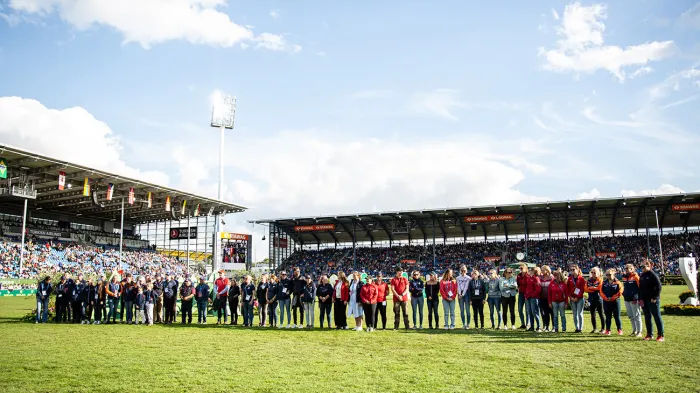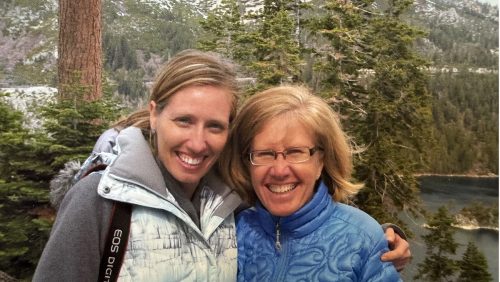I was one of the 19.5 million viewers who tuned in for the men’s basketball gold medal final at the Paris Olympic Games. As I watched Team USA step atop the podium to cement their victory over France, the camera panned to the U.S. coaching staff clapping in unison from the sidelines.
Then came the comment from an NBC analyst: “What a shame coaches don’t get medals in the Olympics.”
Although it wasn’t the first time over the Games’ duration that I heard or read similar statements, this particular comment validated the possibility of my own thoughts holding weight. Thoughts about whether grooms, the cornerstone of our equestrian industry, deserve medals, too.
To Medal Or Not To Medal
You could argue that championship medals should remain exclusive to athletes. After all, they’re the ones striving valiantly, as Theodore Roosevelt poignantly said. They’re the ones putting in the time, effort and sacrifice required to not only qualify for a championship but to win there, all while positioned on the frontlines of public opinion.

You could also argue that grooms already receive compensation for their work, or that they’re no different from any other athlete’s support system, none of whom receive medals in sports like basketball, gymnastics or swimming. At the surface level, it may seem of little consequence for grooms to be treated any differently. That is until you factor in the horse, one-half of the medal-contending partnership.
Horses aren’t machines that can be turned off at the end of the day or whose broken parts can be replaced with a call to the dealership. Their wellness and ability to execute athletic feats depend upon the care, management and around-the-clock observation they receive. At the high-performance level, these responsibilities largely fall on their grooms.
How many riders, left to their own devices, would willingly do the grunt work of transporting their horses to shows, sleeping in their stalls, nursing their health and coordinating logistics? If given a choice, how many riders would trade the luxury of handing their horses off for the challenges and hardships their grooms often endure?
ADVERTISEMENT
While the likelihood of the International Olympic Committee awarding medals to grooms is as probable as the horses themselves becoming recipients, is it unreasonable to advocate for a reality where grooms receive specialized medals at Fédération Equestre Internationale championships?
What Do the Grooms Think?
I contacted several current and retired FEI grooms and barn managers to get their take on the subject.
Some of the grooms I spoke to never considered receiving a medal, chalking it up to the often-thankless nature of the job. Others placed value in alternative forms of recognition, like receiving a bonus check when their rider wins big, being included in celebrations or getting acknowledged on social media. While medals didn’t matter for some, others welcomed the concept.
The more I spoke to grooms and heard their varied responses, the more the notion of them receiving medals took on a deeper, more symbolic meaning. Each perspective boiled down to thoughtfulness and the different ways people feel accounted for.
It’s important to point out that there are numerous initiatives already working to better credit and reward grooms for their efforts. In April 2022, the FEI formally recognized the International Grooms Association, a first-of-its-kind partnership created to elevate the welfare and career legitimacy of FEI grooms. At FEI championships, like the 2022 ECCO World Championships in Demark, grooms are introduced on the livestream and Jumbotron as their riders enter the arena. They are also recognized and included during the prize-giving ceremonies. In making team announcements, the U.S. Equestrian Federation and other national federations now regularly name grooms, along with horses, riders and owners.
Earlier this summer at CHIO Aachen (Germany), grooms were collectively awarded the prestigious Prize of the City of Aachen, historically given to a single individual for making a profound contribution to the show.
The Winter Equestrian Festival in Wellington, Florida, presents a weekly $500 Grooms Award sponsored by Double H Farms. And at the recent RDS Dublin Horse Show in Ireland, show jumper Cian O’Connor’s Karlswood stable sponsored the inaugural 10,000 Euro Karlswood International Grooms’ Competition. Former international grooms Marie York and Jimmy Doyle judged horse turnout during the week’s five-star classes, selecting grooms Virginie Casterman (groom for McLain Ward), Charlotte Verger (groom for Switzerland’s Janika Sprunger), and Shauna Murray (groom for Ireland’s Darragh Kenny) as the top three recipients, respectively.
“Acknowledging the role of grooms is an important part of changing the culture in equestrian sport so that all members of the team are celebrated for their contribution,” an IGA spokesperson said. “Of course, any initiative to shine the spotlight on grooms needs to be matched with the day-to-day practical measures which make the grooms’ working life easier.
ADVERTISEMENT
“We would love to see grooms awarded medals too,” the spokesperson said, “but we also know that ensuring grooms feel appreciated in their work is often about the behind-the-scenes things like suitable amenities, good communication from shows and riders or easy access to food and drink whilst working. Many of the shows who offer grooms’ prizes are also working hard to improve their groom provision in other areas, and this means happy grooms!”
Narratives And Perceptions
I have a soft spot for grooms, having been in their shoes what feels like a lifetime ago. During my two and a half years at a dressage barn, I took pride in being the person the horses whinnied after or softened toward when they weren’t feeling well. I wore my perfect attendance record as a badge of honor until burnout set in—and I departed soon after.
Unsurprisingly, the grooms were among my favorite humans to interview when I wrote for The Chronicle of the Horse. The best conversations weren’t centered around their riders but their upbringings, backgrounds and what drew them to horses in the first place.
In an industry working toward greater accessibility and inclusivity, grooms continue to remind me of how expansive the term “equestrian” is and how much further our industry could reach if we marketed a more comprehensive picture of its key players and ecosystem.
Not everyone will enter the arena on horseback, but they might be inspired by grooms like Casterman, Verger and Murray to choose similar career paths. Granted, it’s not in the cards for everyone to be a rider’s right hand. Some horse-loving kid might look to the brilliance of Santiago Varela and think, “I want to design jumper courses like him.” Or become an equine physiotherapist for U.S. show jumping, like Janus Marquis.
Looking ahead, I hope the FEI and future championship hosts will redouble their efforts to recognize and award our grooms. Medal or not, I envision a future where grooms also step atop the podium to the roaring applause of the crowd.
Tori Repole was born in Kingston, Jamaica, and immigrated to Florida at age 7. Her journey with horses began in 2008 at the Kiwanis Horses for the Handicapped program in Davie, Florida, where she spent four years volunteering. In 2013, Tori began volunteering at a local dressage barn and worked her way up to head groom over the course of two and half years. She developed a passion for journalism through photographing and writing about horses, breaking into equestrian media with her first published piece in 2017. Repole, 30, landed a full-time position with The Chronicle of the Horse in 2018 before temporarily leaving the industry in 2021. It remains her lifelong goal to help equestrian sport become more diverse and accessible.














